|
|
|
Sort Order |
|
|
|
Items / Page
|
|
|
|
|
|
|
| Srl | Item |
| 1 |
ID:
118576
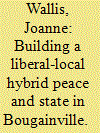

|
|
|
|
|
| Publication |
2012.
|
| Summary/Abstract |
There has been an increasing attempt to theorise the emergence of a liberal-local hybrid approach to state-building, which recognises the coexistence and interaction of liberal and local socio-political institutions. There has not yet been a sustained attempt to understand what occurs when a liberal-local approach is adopted from the outset of a state-building operation. This article seeks to fill this gap by applying the literature to the state-building process in Bougainville, an autonomous region of Papua New Guinea.
|
|
|
|
|
|
|
|
|
|
|
|
|
|
|
|
| 2 |
ID:
179811
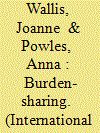

|
|
|
|
|
| Summary/Abstract |
One of President Joseph Biden's foreign policy priorities is to ‘renew’ and ‘strengthen’ the United States' alliances, as they were perceived to have been ‘undermined’ during the Trump administration, which regularly expressed concern that allies were free-riding on the United States' military capability. Yet the broad range of threats states face in the contemporary context suggests that security assistance from allies no longer only—or even primarily—comes in the form of military capability. We consider whether there is a need to rethink understandings of how alliance relationships are managed, particularly how the goals—or strategic burdens—of alliances are understood, how allies contribute to those burdens, and how influence is exercised within alliances. We do this by analysing how the United States–Australia and Australia–New Zealand alliances operate in the Pacific islands. Our focus on the Pacific islands reflects the United States' perception that the region plays a ‘critical’ role in helping to ‘preserve a free and open Indo-Pacific region’. We conclude that these understandings need to be rethought, particularly in the Pacific islands, where meeting non-traditional security challenges such as economic, social and environmental issues, is important to advancing the United States, Australia and New Zealand's shared strategic goal of remaining the region's primary security partners and ensuring that no power hostile to their interests establishes a strategic foothold.
|
|
|
|
|
|
|
|
|
|
|
|
|
|
|
|
| 3 |
ID:
181944
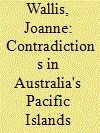

|
|
|
|
|
| Summary/Abstract |
The Australian government demonstrates strategic anxiety about the ‘crowded and complex’ geopolitics of the Pacific Islands region. This reflects its broader concerns about geostrategic competition in the ‘Indo-Pacific’, and its perception that Pacific states are ‘small’ and ‘weak’ and therefore vulnerable to influence from potentially hostile powers. Simultaneously, the government has vowed to ‘step-up’ its engagement with its ‘Pacific family’, emphasising that its relationships with Pacific states will be characterised by respect for, and listening to them, as equals. But while the government has articulated its intention to improve its relationships with Pacific states, puzzlingly, it adopts policies that undermine this goal. This article analyses how and why this occurs. It outlines what this analysis demonstrates about how leaders and officials perceive the Pacific, what assumptions and habits inform those beliefs, and as the ‘step-up’ moves from announcement to implementation, how they are translated into behaviour via government policy. It concludes by arguing that Australian leaders and officials should seek consistency in their discourse about, and policies toward, the Pacific, guided by the discourse of the ‘Blue Pacific’.
|
|
|
|
|
|
|
|
|
|
|
|
|
|
|
|
| 4 |
ID:
175362
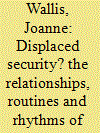

|
|
|
|
|
| Summary/Abstract |
This article considers what treating individual international interveners engaged in peacebuilding work as referent objects can tell us about emplaced security. This is important because individual interveners are diverse, embodied agents who can impact the agency, peace and security of conflict-affected populations. It argues that applying an ontological security lens can provide a partial explanation for why interveners develop narratives and perform practices, including why they sometimes identify and behave in counterproductive, and even damaging, ways. The final section considers why an analytical focus on place is valuable, noting that place-based experiences and place-identities are formative of ontological security. It argues that treating interveners as a referent object provides opportunities to rethink the tendency to focus on home as the key site of emplacement in the ontological security literature. Building on this, it argues that examining the emplaced security of interveners invites us to examine the political nature and consequences of interveners’ physical and ontological security-seeking narratives and practices, including their creation of the material and ideational structures of intervention spaces and places.
|
|
|
|
|
|
|
|
|
|
|
|
|
|
|
|
| 5 |
ID:
187472
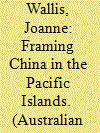

|
|
|
|
|
| Summary/Abstract |
How did many Australians come to accept that competition, rather than cooperation, with China was necessary in the Pacific Islands? We use discourse analysis techniques to examine the role that framings in Australian official discourse, media, and commentary over the last decade (2011–2021) played in constructing China’s presence in the region as threatening such that many Australians have accepted that policies aimed at competing with China are the most reasonable foreign and strategic policy response. We find that Australian official discourse was characterised by qualified optimism about China’s role until 2018, when a more explicit emphasis on competition emerged. Echoing this shift, while the media and (much of) the commentary framed China’s role in terms of threat and competition throughout the decade, this framing increased significantly in 2018. It is impossible to isolate the Australian government’s policy approach to China in the Pacific Islands from its broader understanding of China’s increasingly activist role in Australia, the Indo-Pacific, and globally. But our findings suggest that, by consistently framing China in terms of threat and competition, the media and – to a lesser extent, commentary – created an enabling environment for the public to accept changes to the Australian government’s policies.
|
|
|
|
|
|
|
|
|
|
|
|
|
|
|
|
| 6 |
ID:
103188
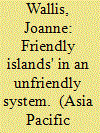

|
|
|
|
|
| Publication |
2010.
|
| Summary/Abstract |
Tonga became the 151st member of the World Trade Organization (WTO) in July 2007. This article considers the issues that Tonga faced during its WTO accession process, and the potential impact of the reforms it has made in compliance with the terms of its accession. It notes that WTO membership may offer some benefits to Tonga, including improved market access for its exports and the provision of technical assistance. The taxation and regulatory reforms necessitated by accession might also have some positive development effects. However, this article argues that the costs of WTO accession outweigh these benefits. This is because Tonga faced numerous challenges during its accession process, which led it to agree to substantial trade concessions. In addition, the 'special and differential' (S&D) treatment provisions intended to assist developing countries like Tonga once they become WTO members are inadequate. While this article focuses on Tonga, the issues raised are relevant to other Pacific SIDS engaged in WTO accession negotiations, including Vanuatu and Samoa.
|
|
|
|
|
|
|
|
|
|
|
|
|
|
|
|
| 7 |
ID:
151447
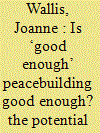

|
|
|
|
|
| Summary/Abstract |
There is a palpable sense of humility within the United Nations and other international institutions regarding peacebuilding. Rather than seeking to implement the liberal peace, they now pursue the more modest goal of ‘good enough’ outcomes. This shift reflects a growing consensus in the critical literature that space needs to be provided for the local agency that will ultimately determine the outcomes of peacebuilding. At first blush this emphasis on local agency is positive; it offers an important correction to the technocratic and generally top-down nature of liberal peacebuilding. But, is the ‘good enough’ approach to peacebuilding good enough? What are the pitfalls and potential of the local turn? This article uses a case study of Timor-Leste to answer these questions. It finds that the local turn can help lend legitimacy to the state and increase opportunities for political participation and the delivery of public goods at the local level. However, the emerging evidence from Timor-Leste also highlights the pitfalls of the local turn. Most significantly, the state can transfer responsibility for public goods provision to the local level in order to lessen the burden on the state and to divert attention from ineffective or illegitimate central institutions.
|
|
|
|
|
|
|
|
|
|
|
|
|
|
|
|
| 8 |
ID:
117199
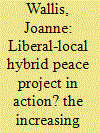

|
|
|
|
|
| Publication |
2012.
|
| Summary/Abstract |
The liberal peace project has dominated state-building operations since the end of the Cold War, including in Timor-Leste. However, the attempt to institutionalise the liberal peace faced significant challenges in Timor-Leste's fragmented subsistence-based society. This resulted in the creation of shallowly rooted and poorly-understood liberal state institutions that were disconnected from the majority of Timorese, who continued to follow their local sociopolitical practices. In response, the state has increasingly engaged with these local practices in order to create state institutions that make sense to the people they seek to govern. This engagement has occurred through the formalisation of local sociopolitical institutions, the recognition of local justice systems and the utilisation of local ceremonies and practices. Therefore, this article argues that a liberal-local hybrid peace project has emerged to guide state-building in Timor-Leste, which may indicate how similar projects could develop in the future.
|
|
|
|
|
|
|
|
|
|
|
|
|
|
|
|
| 9 |
ID:
122816
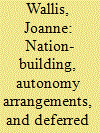

|
|
|
|
|
| Publication |
2013.
|
| Summary/Abstract |
After a protracted war of secession in 2001, the Bougainville region of Papua New Guinea was granted autonomy and deferred a referendum on its political future. This article argues that the Bougainville case highlights the challenges posed by attempts to settle self-determination disputes using these tools. It considers the challenges posed by deferred referendums, principally how to reconcile competing interpretations of the identity and future political status of the region. It also considers the challenges posed by attempts to negotiate the relationship between the unique identities of autonomous regions and their identities within the larger state.
|
|
|
|
|
|
|
|
|
|
|
|
|
|
|
|
| 10 |
ID:
143921
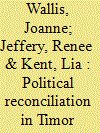

|
|
|
|
|
| Summary/Abstract |
In recent years, the study and practice of political reconciliation has experienced a turn to hybridity. This turn has been defined by the increased rate at which liberal international and local peacebuilding practices, and their underlying ideas, have become merged, integrated or co-located in time and space. While hybrid approaches to reconciliation have been praised as an effective means of engaging local populations in peacebuilding operations, little attention has been paid to examining whether or not they also bring unintended negative consequences. Drawing on the cases of Timor Leste, Solomon Islands and Bougainville, this article examines the potentially dark side of hybridity. It demonstrates that, in each of these cases, hybrid approaches to political reconciliation have brought both positive and negative consequences. On the positive side of the equation, hybridity has seen imported international approaches to reconciliation adapted to meet local demands and ensure resonance with local populations. On the negative side, however, the misappropriation and instrumentalisation of local practices within hybrid approaches has served to damage their legitimacy and to jeopardise their contributions to reconciliation. The article thus concludes that the existence and extent of this dark side necessitates a re-evaluation of how hybrid approaches to political reconciliation are planned and implemented.
|
|
|
|
|
|
|
|
|
|
|
|
|
|
|
|
| 11 |
ID:
165123
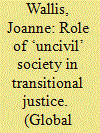

|
|
|
|
|
| Summary/Abstract |
Transitional justice (TJ) scholarship and practice often pins much hope on civil society. It generally assumes that civil society organisations demonstrate ‘civility’, have broad-based memberships, support liberal democratic values and promote TJ approaches based on liberal-legal justice strategies. Yet there is nothing inherently virtuous about civil society and in conflict-affected societies it often lacks these desired properties; it can be underdeveloped, unruly and disruptive. So, what role do, and should, ‘uncivil’ society groups play in TJ processes? To answer this question this article uses comparative case studies of the role of uncivil society groups in Bougainville and Timor-Leste. These cases exhibit similar broad cultural, socio-political and socio-economic characteristics. In both cases uncivil society groups are organised around societal divisions, attempt to operate as alternatives to the state, oppose liberal democracy and liberal-legal TJ processes and engage in unruly behaviour, including violence and criminality. These uncivil society groups are not regarded as internationally legitimate, but they nevertheless have strong local legitimacy, particularly when the state is absent or weak. Consequently, this article concludes that in conflict-affected societies it is necessary to engage with groups regarded as both civil and uncivil to promote locally legitimate and effective TJ, and peace more broadly.
|
|
|
|
|
|
|
|
|
|
|
|
|
|
|
|
| 12 |
ID:
142022
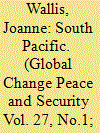

|
|
|
|
|
| Summary/Abstract |
The term ‘arc of instability’ was first used in 1999 to describe the security challenges facing the South Pacific. It subsequently came to dominate Australian political discourse, although its veracity was critiqued. This article considers how Australia's political discourse about the region has evolved since 1999 and what impact this has had on Australia's relationships in the region. It begins by outlining why the arc of instability characterization emerged and how it contributed to the securitization of the South Pacific, which justified Australia's policy of new interventionism in the region. It concludes by considering whether it might be time to recharacterize the region as an ‘arc of opportunity’. This recharacterization may shift the political discourse to focus on the South Pacific's potential and opportunities, desecuritize Australia's relationship with the region and diffuse concerns about continued Australian intervention by articulating a more cooperative approach.
|
|
|
|
|
|
|
|
|
|
|
|
|
|
|
|
| 13 |
ID:
165121
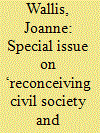

|
|
|
|
|
| Summary/Abstract |
This article, and the special issue it introduces, joins an emerging conversation about the role of civil society in transitional justice (TJ). Although civil society organisations play an integral role in the pursuit of TJ in conflict-affected societies, the literature lacks a comprehensive conceptualisation of the diversity and complexity of these roles. Building on an interdisciplinary workshop at the Australian National University in September 2016, the contributions to this special issue explore the forms of civil society that are enabled and disabled by TJ processes and the forms of TJ activity that are enabled and disabled by different kinds of civil society actors.
|
|
|
|
|
|
|
|
|
|
|
|
|
|
|
|
| 14 |
ID:
111175
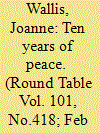

|
|
|
|
|
| Publication |
2012.
|
| Summary/Abstract |
Between 1989 and 1997 Bougainville endured a complex secessionist war and localised conflict in which it is estimated that as much as 10% of its population died and up to 40% were internally displaced. In light of the extreme scale of the destruction wrought by the war, it is somewhat surprising how successful the peace process has been. In 2001 a comprehensive political settlement, outlined in the Bougainville Peace Agreement, granted Bougainville extensive political autonomy and guaranteed that a referendum would be held on its political future 10-15 years after an autonomous government was formed. By 2005 Bougainvilleans had worked together to conduct a weapons disposal process, draft a constitution and establish the Autonomous Bougainville Government (ABG). This article considers the progress that Bougainville has made implementing autonomy by evaluating the performance of the ABG. It concludes by foreshadowing Bougainville's future prospects, including the role that autonomy and the deferred referendum have played in settling the self-determination dispute.
|
|
|
|
|
|
|
|
|
|
|
|
|
|
|
|
| 15 |
ID:
085151
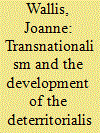

|
|
|
|
|
| Publication |
2008.
|
| Summary/Abstract |
The Kingdom of Tonga is commonly referred to as a 'small island developing state', and is consequently said to experience challenges that hinder its development. Yet significant levels of Tongan migration - and subsequent remittances - have led commentators to challenge this pessimistic view. In particular, Tonga has been characterised as a 'deterritorialised nation-state', whereby the 'state' remains the geographically bounded territory of Tonga; while the 'nation-state' consists of all Tongans, including those overseas. This article seeks to build on previous literature to provide a detailed consideration of how the deterritorialised Tongan nation-state works in relation to the different dimensions of Tongan life.
|
|
|
|
|
|
|
|
|
|
|
|
|
|
|
|
|
|
|
|
|